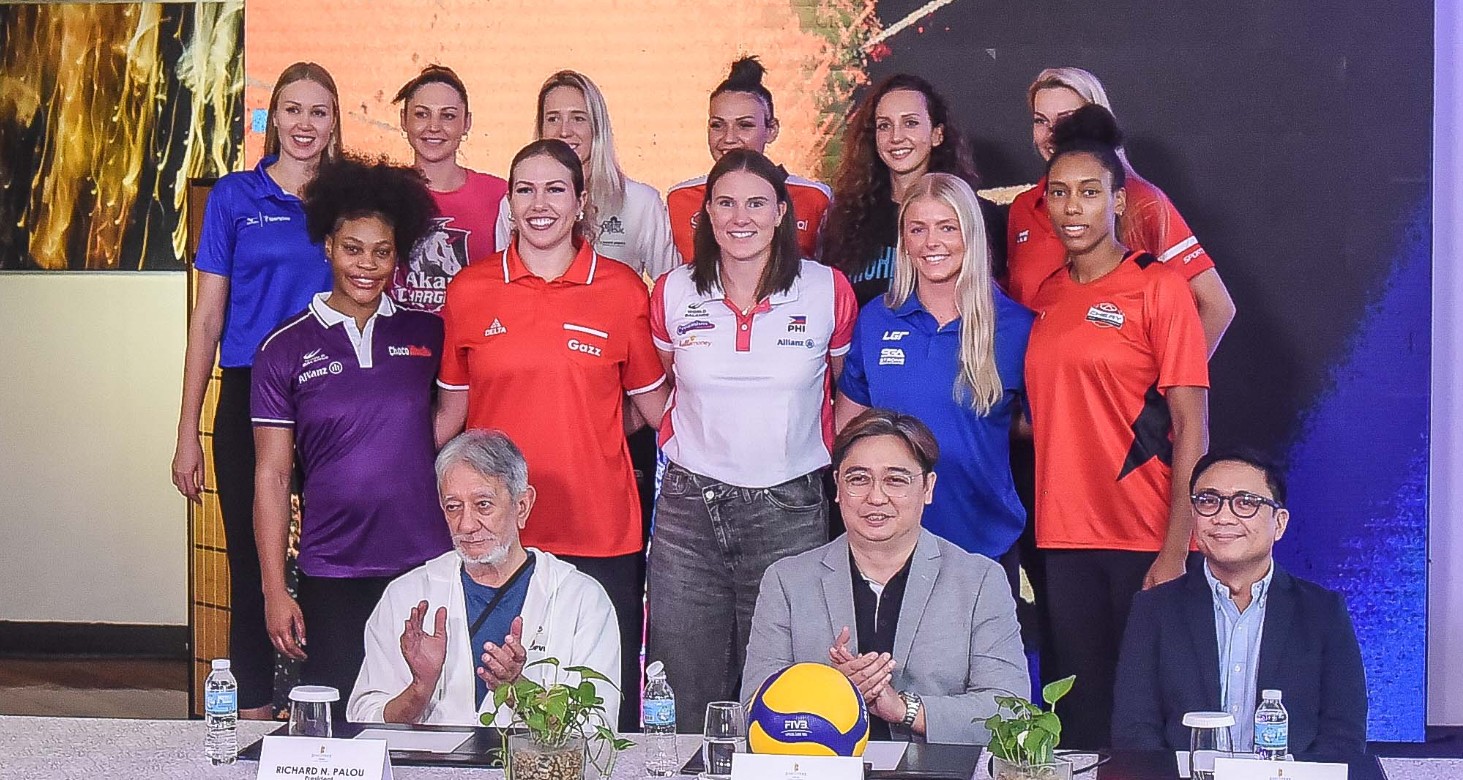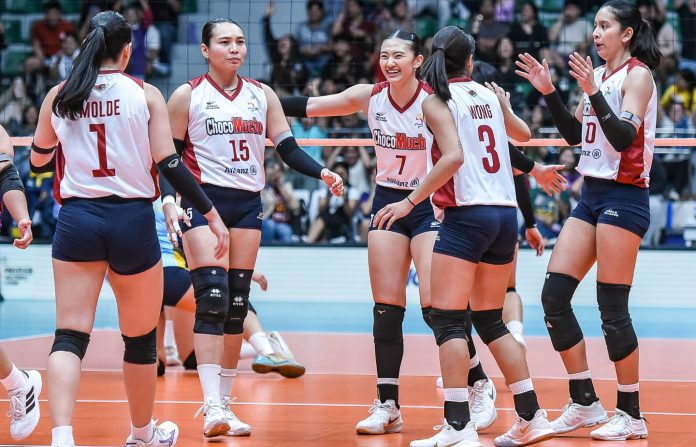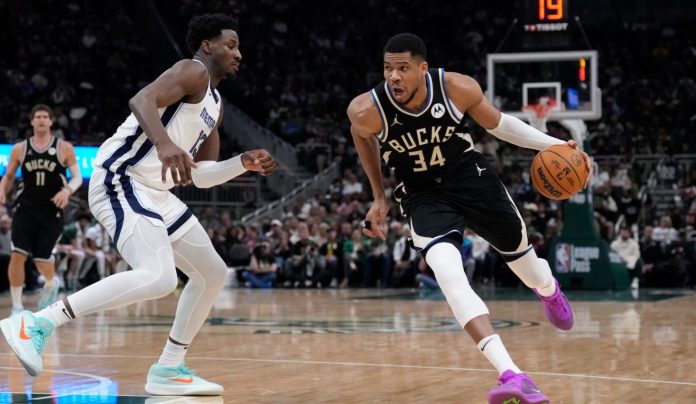The PVL opened its Reinforced Conference in the midst of controversy.
Supposedly an import-laced tournament, four teams—Zus Coffee Thunderbelles, Akari Chargers, Choco Mucho Flying Titans, and Capital1 Solar Spikers—kicked off the action without their reinforcements after the Philippine National Volleyball Federation (PNVF) allegedly refused to endorse the International Transfer Certificates (ITCs) required for foreign imports to compete in the local league.
“The PVL regrets to inform the public that the foreign guest players will not be permitted to participate in the ongoing season-ending conference until their ITCs are duly approved,” said Sports Vision in a statement about the matter on Tuesday, opening day of the PVL’s season-ending tourney.
The PVL, in a separate statement, echoed the same sentiment as Sports Vision, noting that the endorsement wasn’t given “despite the timely submission of all necessary documentation and the completion of signatures from the players, their federations, and PVL clubs.”
“The final endorsement from the PNVF remains pending,” the PVL further stated. “It is important to note that playing without an ITC places athletes at risk of sanctions from the Fédération Internationale de Volleyball.”

On Wednesday morning, however, PVL Control Committee Chairman Sherwin Malonzo announced that all ITCs have been signed and endorsed by the PNVF, effectively clearing the way for the 12 reinforcements and the league’s Fil-Foreigners to play in the PVL Reinforced Conference without fear of being sanctioned by their volleyball federation.
So, all’s well now, right? All is forgiven. Or is it?
More Than a Miscommunication Between the PVL and PNVF
The plot thickens, as evidently, this witholding of ITCs is more than just a snafu and isn’t a simple administrative squabble. What transpired between the PVL and the PNVF is a public relations disaster for Philippine volleyball—one that reveals a deep, festering problem in how the sport is governed, managed, and respected.
This problem, unfortunately, is damning on so many levels, even if it has been apparently resolved a day after the storm. For one, when two of the country’s top volleyball institutions cannot align on something as basic as the eligibility of foreign players, the optics it sends to fans, athletes, and potential investors alike is that Philippine volleyball still lacks unity, professionalism, and a sense of shared purpose.
Reports indicate that the PNVF initially withheld the endorsements to force the PVL to end its season earlier than planned to give the national team—Alas Pilipinas Women—more time to prepare for the Southeast Asian Games to be held in Thailand this December. The Reinforced Conference, which began on October 7, is slated to run until November 27, but the PNVF supposedly wants the league to end the tournament by November 16.

PNVF Governance or Gatekeeping?
At its core, the issue highlights the tug-of-war between league independence and federation authority. The PVL has long operated as a professional league, crafting its own identity and building a loyal fan base. The PNVF, on the other hand, is the governing body recognized by the international federation (FIVB), with the power to sanction competitions and regulate players.
But when governance turns into gatekeeping—when administrative procedures are used to assert control instead of promote growth—the sport suffers. In this case, what should have been a celebration of global talent and competitive excellence devolved into an embarrassing spectacle of bureaucracy and ego.
Fallout from the Controversy
As a result, fans eagerly anticipating international-caliber volleyball were left disappointed. Sponsors, who had invested in marketing campaigns around foreign stars, were blindsided. The athletes themselves—both local and foreign—were caught in the crossfire, unsure how to proceed, especially after weeks of preparing for the tournament with their imports in tow.
Bigger picture, this stalemate could have massive ramifications on Philippine volleyball as a whole. Mainly, this fiasco undermines years of hard work spent raising the sport’s profile. Volleyball has become one of the Philippines’ most beloved sports, thanks to the dedication of players, coaches, and leagues that have cultivated talent and passion from grassroots to professional levels—and the PVL, for all intents and purposes, has been among the biggest movers of the sport.
But all that progress risks being overshadowed by infighting and power struggles that expose Philippine volleyball as a fractured house rather than a united front.
A Matter of Credibility and Unity
Needless to say, the PVL-PNVF debacle is not just about paperwork or politics—it’s about credibility. If stakeholders cannot trust that rules will be clear, fair, and consistently enforced, how can Philippine volleyball expect to attract elite talent, secure long-term sponsorships, and gain international respect?
This might be hyperbole, but the world is watching—or at least, the global volleyball community. And as of now, they might not be liking what they’re seeing from the PNVF and PVL: a sport sabotaging itself from within.
The question now is whether or not the two sides have crossed the proverbial Rubicon where the damage has been rendered irreparable. Hopefully, things haven’t come to that just yet, as it would mean there’s still hope. But the PVL and PNVF must stop treating each other as rivals and start acting like partners in progress.
Put simply, Philippine volleyball deserves better than this embarrassing power play. The fans deserve clarity. The players deserve stability. And the sport deserves the respect it has long worked to earn—respect that will only come when those in charge remember that volleyball, at its heart, is supposed to unite, not divide.








